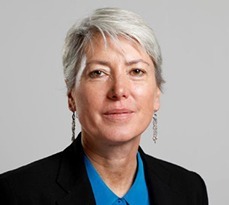More equal societies can mitigate crisis risk, says keynote speaker at annual Risk Summit of the Centre for Risk Studies.

Governments should act “more as an insurer” by seeking more equitable societies rather than simply responding to crises, the CEO of the Impact Investing Institute told the annual Risk Summit of the Centre for Risk Studies at Cambridge Judge.

“More equitable societies are more resilient societies,” Sarah Gordon told the 11th annual Risk Summit, held virtually this year. “If everyone had access to decent health care, shelter and clean water, the impact of the coronavirus crisis would have been far lower.”
A former Financial Times journalist, Sarah Gordon delivered a keynote speech at the Risk Summit and appeared on a closing panel that also included Alan Jagolinzer, Professor of Financial Accounting and Director of the Centre for Financial Reporting & Accountability at Cambridge Judge.
She called on companies to issue – voluntarily for now but later as part of their compulsory annual report – a Public Interest Statement that outlines both their positive and negative impacts regarding social, environmental and governance (ESG) issues.
“Companies that get on the front foot on this will have a competitive advantage and will be rewarded by investors now,” she said, adding that there is an increasing “understanding that ESG is not just a risk-mitigation measure but a way to ensure higher-quality profit streams in the future.”
“By reporting non-financial as well as financial information, a more complete picture of an organisation is presented. And by measuring and reporting progress against non-financial indicators, organisations can articulate their full scope of business risks as well as the benefits that they bring to the wider world,” she told the Risk Summit, entitled “The Resilient Company – Managing Business Risks”.
Other keynote speakers at the Risk Summit were Michael Power, Professor of Accounting at The London School of Economics and Political Science, and Mihir Mysore, Global Leader, Crisis Response & Resilience at McKinsey & Company.
Professor Jagolinzer of Cambridge Judge discussed the current challenging environment for corporate auditors at a time when auditors can’t gain access to offices and other facilities. “A lot of teams are doing inventory by drone because they can’t get on the ground,” he told the closing panel, which was chaired by Professor Daniel Ralph, Academic Director of the Centre for Risk Studies.
Asked about the impact of artificial intelligence (AI) on auditing, Alan said that the “credibility of the data” remains pivotal whether auditing is conducted by AI or more traditional means. “”I’m more concerned about the quality of the inputs than the quality of the outputs.”
The annual Cambridge-McKinsey Risk Prize, open to all postgraduate students at the University of Cambridge, was also announced at the Risk Summit.
The 2020 award was won by Sam Vosper, a PhD candidate at the Department of Land Economy and a researcher at the Cambridge Centre for Environment, Energy and Natural Resource Governance, for a paper entitled “Insure or Unsure? A Case of the Basis Risk Dilemma in the Developing World”.
The paper looks at the impact that basis risk can have on the uptake of index insurance, and has implications for tackling poverty and food security.
Honourable mentions for the Risk Prize went to Moritz Baer, a Master of Philosophy in Environmental Policy student at the University of Cambridge, on risks for the financial system in reallocating capital away from fossil fuels, and Bradley Lloyd Gibb, an MBA student at Cambridge Judge Business School, on risks associated with plastics.

